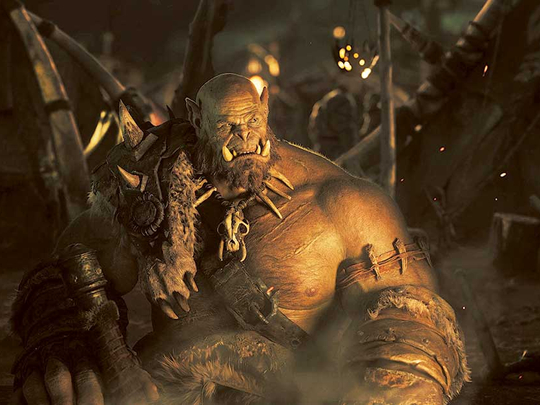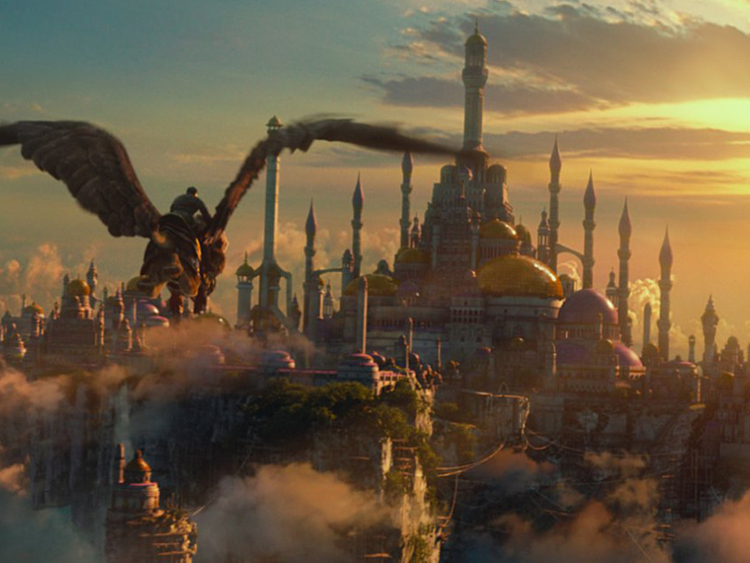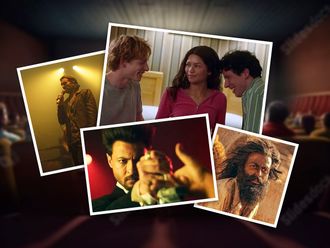
You could see Warcraft as just one more entry in the arms race of summer movies. Adapted from the popular video game series, the film (out in the UAE now) depicts the conflict on a mythical world called Azeroth, as humanity defends itself from a horde of invading orcs. With its intricate visual effects, immense battle sequences and a reported budget of $100 million (Dh367 million), it is a movie that its creators dearly hope will provide the foundation for a blockbuster franchise.
Yet Warcraft is an intensely personal undertaking for its director, Duncan Jones. It is a supersize project that this filmmaker and dedicated gamer (who turns 45 on Monday) passionately campaigned to make, with just two previous movies on his resume.
It is also a film whose years-long creation circumscribed a period of upheaval and tragedy in Jones’ life. When he started work on Warcraft in 2012, he had just married his wife, Rodene, after she was given a diagnosis of breast cancer and had a double mastectomy. Then, as the movie was nearing completion, Jones’ father, rock star David Bowie, died of cancer in January.
“My film started and ended with cancer,” Jones said during a recent interview.
Now, with Warcraft out and Rodene Jones preparing to give birth to the couple’s first child, Jones cannot help but regard the film — with its subplots of fathers and sons, and an orc couple preparing for their first baby — as a distillation of some of the very best and very worst experiences he has had.
“Warcraft is going to be a period of my life I treasure and loathe at the same time,” he said.
On this May afternoon, Jones was sitting in a conference room at Industrial Light & Magic, the effects company that helped create the medieval settings and motion-capture orcs for Warcraft.
Surrounded by whiteboards filled with Star Wars doodles and math equations, Jones was wearing a bushy beard, a broad smile and a custom T-shirt with an orc recreating Bowie’s famous mugshot photo for a 1976 marijuana arrest.
Setting aside the celebrity lineage of Jones (who is the son of Bowie and his first wife, Angela), he has become an accomplished director in his own right. His 2009 debut feature, Moon, was a well-reviewed Stanley Kubrick-style suspense film that starred Sam Rockwell as an astronaut working in solitude on a lunar base.
Jones’ second movie, Source Code, a science-fiction thriller starring Jake Gyllenhaal, was a commercial hit in 2011.
But Jones said he struggled to put together a planned third film, and the only projects that studios offered were sequels to other directors’ movies.
“I don’t want to build on someone else’s legacy,” he said. “I wanted to establish my own thing.”
That opportunity presented itself with Warcraft, which video game publisher Blizzard Entertainment had spent years trying to get made. When director Sam Raimi left the project, Jones pounced, only to be disappointed by the screenplay.
“It was the stale fantasy trope of, humans are the good guys, monsters are the bad guys,” Jones said. “It just didn’t capture in my gut what made Warcraft, the idea of heroes being on both sides.”
Chris Metzen, who is Blizzard’s senior vice-president for story and franchise development and has worked on its Warcraft and World of Warcraft games for more than 20 years, said his company was also looking for a more balanced story that found “a common humanity” in both sets of characters.
“We were told audiences just aren’t going to sit for that,” Metzen said. “And Duncan comes in, and almost the first thing out of his mouth was, like: ‘Here’s how I see it. It’s 50-50.’ And we just about jumped out of our chairs in joy.”
Although Jones had never made a film as big as Warcraft, Metzen said, “He was obviously just a geek like us — a PC gamer who had spent an inordinate number of hours within World of Warcraft, specifically, and just got it.”
There was plenty of practical experience still to come for Jones, who wrote the Warcraft screenplay with Charles Leavitt.
Developing the motion-capture technology to create the film’s gargantuan, tusk-mouthed orcs took many months for Industrial Light & Magic. Jones said he did not see the first finished shot of an orc until about two weeks into filming, at which point, he said, “There was a huge sigh of relief.”
While shooting proceeded on hangar-size stages in Vancouver, Legendary Entertainment, the media company that produced the film with Atlas Entertainment, moved from Warner Bros. to Universal and was sold to the Dailan Wanda Group, a Chinese conglomerate.
The movie could have faced trouble at these junctures, and Jones said: “I worried my pants off that I’d just wasted a year, two years, three years of my life. But I’m very, very grateful to say they did not affect us.”
Warcraft, which carries a costly price tag and faces steep competition at the summer box office, has been flagged as one of the summer’s riskiest releases by trade publications like The Hollywood Reporter.
But Jones earned praise from his cast members for never being overwhelmed by the scope of the film, which required a lot of on-set imagination to fill in characters and settings that were added months later.
“There’s times where we’re all lined up and you have to ask him, ‘Where are we, and where are we going?’” said Travis Fimmel (a star of TV’s Vikings and the film Maggie’s Plan), who plays the film’s human hero, Anduin Lothar. “You just have no idea. Duncan just had every answer. He’d spent so long preparing that he had the whole film in his head already.”
Toby Kebbell, who plays the orc Durotan, a tribal leader and father to be, said he was surprised to find that Jones, beneath a pleasantly rumpled exterior, has the desire to be a director on the scale of James Cameron or Peter Jackson.
“Anyone who comes into that category is absolutely a lion,” Kebbell said. “The ambition is something to respect. I think it’s wonderful that someone we all thought was going to be lo-fi has actually got the ability to take a genre piece, make it fun, keep it entertaining and choke you up.”
Jones was understandably wary about discussing his father and cautioned at one point, “I don’t want to give you too much of an in to ask me about my dad.”
But while he might wish for more time to mourn his father in private, Jones said he recognised that with a costly new movie needing promotional support, he had to put himself out there, however tentatively.
“The timing isn’t ideal,” he said. “I would rather not have had to do all of this. But in any other circumstances, I’d want to do this. That’s how I’m approaching it.”
Jones said that his father, an avid fan of fantasy and science fiction (and a star of films like Labyrinth), had been encouraging of Warcraft.
“I showed him an early, early cut of the film,” Jones said, “and he was very excited for me and was pretty amazed about how we achieved some of the visuals. I took him through how we did some things.
“It’s always nerve-racking, showing your parents things you’ve been working on,” he added. “But he loved Moon, and he loved Source Code.
“He’s always been incredibly supportive,” Jones said.
Jones said he and Metzen had discussed a possible three-film Warcraft arc if the first movie were to prove successful. But Jones has already decided that he will next direct Mute, a science-fiction film that he has wanted to make for many years and which he said was “way back down on the lower end of the budget.”
That desire to balance mass entertainments with smaller, personal expressions came directly from Bowie.
“One of the things my dad always said is that it’s OK to do one for you and one for them,” Jones said. “He taught me a lot of things, but that’s certainly one of the many that I took to heart.”
The strange symmetry of becoming a father at a time when themes of fatherhood pervade his life was not lost on Jones.
“Listen, my dad had me when he was 25,” he said. “I’ve wanted to have kids since then. I was living vicariously through these characters, and fortunately, it’s happening for real now.”
Looking back to the start of Warcraft, Jones said that his wife was “finishing off her chemotherapy and radiation and double mastectomy and all of that.”
Now, he said, “she’s great, she’s healthy, she’s full of baby.”
To have grappled with loss during the film, Jones said, was “tragic, but at the same time, the fact that we’ve got a baby coming it all just feels ...”
He paused to consider the right words. “Well, that’s the circle of life, unfortunately,” he said. “You go through hardships, and you lose people, and new people come into your life. That’s what life is.”
For him, Jones said, Warcraft will “definitely be one of those bookmarks in life.” With a laugh, he added, “For most people, it’s just going to be a movie.”













